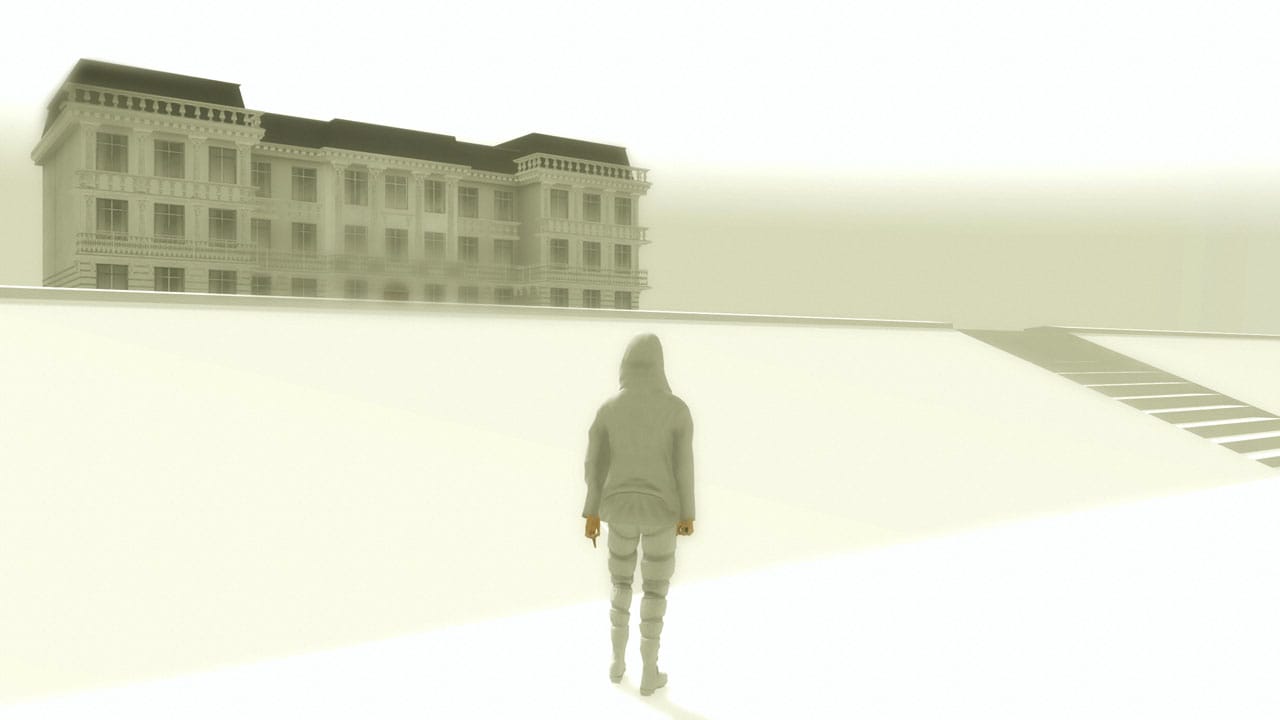
Here are the things you can do in Bientôt l’été (Soon, the Summer), the new art game from Belgian developer Tale of Tales:
-Walk on a beach
-Close your eyes
-Run with your eyes closed
-Find objects on the beach
-Watch your house change sizes and shapes
-Read and listen to cryptic conversations in French
-Listen to distant French music
-Play chess
-Smoke Gauloises
-Drink red wine
That’s it. When I first played the game earlier this fall at IndieCade, I was not impressed, and I dismissed it, glibly, as the first game based on Nights in Rodanthe, leading a friend to joke that I was being unfair to Nights in Rodanthe. Having played an almost-finished version of the game away from the play-happy context of IndieCade, I wish to amend myself, and put this fascinating little game in context.
– – –
Bientôt l’été belongs to a new class of games such as Dear Esther and The Snowfield that fall under the clumsy but useful tag “experiential”, which is a way of saying they are not particularly goal-directed, feature deliberately sluggish or alienating controls, and do not concern themselves much with goal-directed fun. They use the vocabulary of videogames (open-world exploration; control of an avatar; WASD controls) but eschew the structure. The point is to produce an effect in the player.
Michael Samyn and Auriea Harvey, the Tale of Tales duo, describe their game as
Not a deep message that we shout from the mountain. We really have no clue. It is a sort of philosophical drill to burrows in your heart helping you to discover what’s underneath your deepest feelings. And underneath that.
All the sincerity is a little much, and there are times during Bientôt l’été when the heavy-handed artiness of the experience becomes so ridiculous as to prevent the player from feeling anything except a snickering irony. If you can engage the game on a purely aesthetic level, though, it is clearly a sophisticated piece of work. The ghostly look of the game combines with a swirling score to produce an unusually intense melancholy. I don’t think there are any great truths hiding behind the aggressive symbology of the game, but as a way of getting pleasantly sad, it certainly does the trick.
I look forward to a time when games are in a real conversation with the older forms and do not need to use red wine and chess as a shorthand for sophistication.
This is the level on which Bientôt l’été excites me. Games have been for the most part fun-delivery devices – sometimes ingenious ones – that even at their very best produce just that, fun (and occasionally fear). Rare is the game that communicates a deeper or more shaded emotion. I think Bientôt l’été, though over-the-top, is symptomatic of a healthy move for gaming, towards using the tools of the medium to express a wider spectrum of feelings. That’s what art, ultimately, is for.
I’m a bit conflicted, though, because if I saw Bientôt l’été in a museum I would think it was a joke in the vein of Barney Gumble’s Pukahontas (“Don’t cry for me, I’m already dead”). Because I’m playing it on a computer, though, in a medium that has never even attempted to tickle the intellect, I have different standards for it. I’m not sure if this is fair, but I do look forward to a time when games are in a real conversation with the older forms and do not need to use red wine and chess as a shorthand for sophistication.
A friend joked that Bientôt l’été is actually a “being French” simulation, what with the Gallic tobacco puffing, Cabernet Sauvignon swilling, longing for a golden past, and profusion of profundities. It’s funny, and it’s sort of true. It’s also a sign that games are becoming more than just a way to have fun, even if they are in the very, very early stages.




